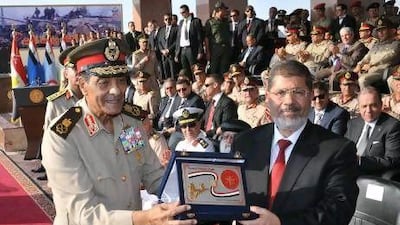CAIRO // As Mohammed Morsi begins his tenure as Egypt's first civilian president, his administration is expected to be one of the most closely scrutinised in modern Middle East history.
On his first working day yesterday, the multiple pressures and complexities facing the long-time Muslim Brotherhood official were on full display.
In addition to uncertainty over how much authority he actually wields, there is criticism from revolutionary circles for, they say, currying favour with the military. There is also the delicate balancing act of dealing with outreach attempts from Egypt's northern neighbour and treaty partner, Israel.
Mr. Morsi's first order of business will be forming a new cabinet to replace the caretaker body that resigned once he had been declared the winner of the presidential elections on June 24.
Yesterday he chaired a meeting with the outgoing cabinet, led by prime minister Kamal Al Ganzoury. The topics discussed included public security and the economy, including the annual budget.
Even this first presidential step is shadowed by the spectre of the power struggles taking place between the Brotherhood and the Supreme Council of the Armed Forces (Scaf).
It is still unclear how much of his cabinet he will be able to choose. A supplemental constitutional declaration, issued by Scaf late last month while the presidential run-off votes were being counted, established the military as the fourth branch of government and carried the implication that the armed forces would decide their own defence minister.
It's expected that the military will be able to evade civilian oversight for now. But if Mr Morsi is unable to appoint his own interior minister and launch the massive sweeping reform that the institution needs, it begins to call into question whether he is really the holder of executive authority.
Mr Morsi also faced criticism yesterday from within revolutionary circles - including groups that backed his candidacy - for statements made during two speeches he delivered following his swearing-in ceremony on Saturday. Mr Morsi repeatedly thanked the military for their service to the nation over the 16 months since Hosni Mubarak was driven from power and credited Scaf with keeping their promise to hand over power.
He also said Egypt, "would not export" its revolution to other countries - a statement that infuriated many revolutionaries who do want to export the revolution throughout the region.
The Kefaya movement issued a statement denouncing several elements of the speeches and Ahmed Maher, the coordinator of the April 6 movement and a very public backer of Mr Morsi in the run-off vote, said he was disappointed. "It was too political," Mr Maher told the state-owned Ahram Online site. "[Morsi] thanking Scaf only made our position weaker."
The reality is it would have been politically impossible for Mr Morsi not to say something good about the military. But the quick-trigger condemnations underscore his small margin of error and how many of those who voted for him will be watching his every move for signs of betrayal.
On the foreign policy front, details emerged on Israel's the first steps toward establishing communication with Mr Morsi. According to Israeli news reports, both the prime minister, Benjamin Netanyahu, and the president, Shimon Peres, sent letters congratulating him on his victory.
Mr Netanyahu's letter, according to a government official quoted in the Israeli daily Haaretz, stressed "Israel's desire for further cooperation and strengthening peace".
Behind the diplomatic niceties is a mounting Israeli concern over just how its relationship with Egypt will change. Mr Morsi had promised to uphold all standing treaties and agreements, including the 1979 Camp David accords that ended nearly 30 years of conflict between Israel and Egypt. But his campaign statements, calling for the liberation of Gaza and Jerusalem, have been widely quoted in the Israeli media.
Mr Peres spoke bluntly when asked recently if the Egyptians would continue to honour Camp David. "The decision is up to them, if they refuse to deal with us, they should pay for it ... they have to decide how Egypt will provide bread for their children," he said.

